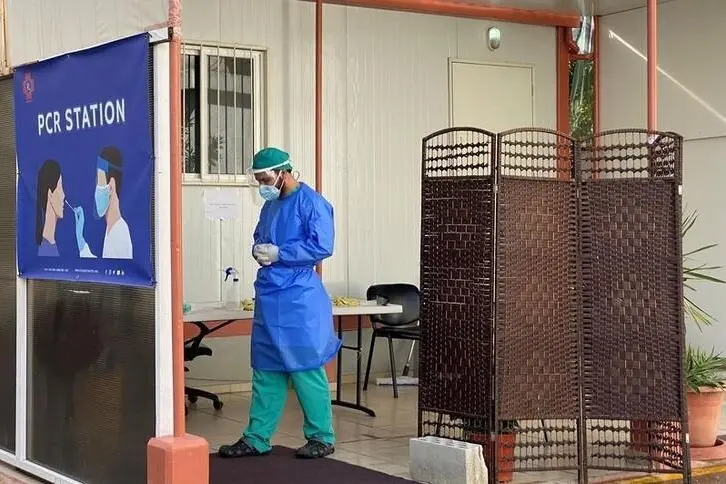PHOTO
BEIRUT: Lebanons coronavirus vaccination program will start with a shipment of just 50,000 doses of the Pfizer-BioNTech developed vaccine, arriving Feb. 8, the head of the parliamentary health committee told The Daily Star Monday.
MP Assem Araji explained the 2.1 million doses of the Pfizer vaccine ordered by the Health Ministry will begin arriving in weekly installments starting next month, with 250,000 expected by the end of March.
The Health Ministry has now secured around 6 million doses of vaccines. In addition to 2.5 million arranged through COVAX, the WHO-led initiative, a further 2 million doses of the Oxford-AstraZeneca developed jab will be imported in March. It is not yet clear when COVAX will start shipping but Araji revealed that Lebanon is on top of the list, due to the alarming rate of infections across the country.
Over the last week, several countries across the world, including Italy, Singapore and the UAE have reported delays in shipments of Pfizer vaccine. The company said last week it was delaying shipments for the next few weeks as a result of work to restructure its production line at its plant in Belgium.
As a result, the Health Ministry was concerned Lebanons order would be impacted.
We have asked them this question as we are in a drastic situation [in Lebanon], the health sector is day to day collapsing they [Pfizer] said no, they are still promising to deliver [the order] on time Araji said.
Araji explained the quantity of Pfizer doses given would begin slowly in order for the doctors and nurses administering the vaccine to become familiarized with the procedure, while taking into consideration any potential complications.
Pfizer promised [delivery] on a weekly basis so we have arranged our national program according to WHO requirements, he said.
Lebanons national vaccine program will follow WHO guidelines, which recommend the inoculation of health workers and the elderly over 74 years old first. As citizens begin to be vaccinated, the age range will then be lowered to those aged 54 and above, before opening up the program to the rest of society.
A vaccine registration platform coordinated by the Health Ministry for residents who express their interest in receiving the jab, either online or via telephone, will be live Tuesday evening according to Araji.
Everyone who registers will be invited to declare their name, age, date of birth, address, and any medical issues. The system will then allocate a slot to receive the vaccine according to the priority list, Araji explained. Those with underlying health conditions such as diabetes or autoimmune diseases will also take precedence.
Citizens will be allocated to one of 42 hospitals approved by the Health Ministry to administer the jab. In Beirut there are currently nine hospitals; including Rafik Hariri University Hospital, American University of Beirut Medical Center and Geitawi Hospital.
Outside the capital, 11 hospitals in the north, 11 hospitals in Mount Lebanon, six in the south, and five in the Bekaa/Baalbeck Hermel region will be able to offer jabs, according to the list released by the Information Ministry Monday.
But caretaker Health Minister Hamad Hasan indicated the list was not accurate and said an official list of inoculation centers would be released Tuesday.
The government, along with substantial assistance from the World Bank, has covered the cost of the countrys inoculation drive. Last week, the World Bank announced that it had reallocated $34 million to purchase vaccines, the first time the bank has procured funds for a countrys vaccine program. The money will provide jabs for over 2 million individuals in Lebanon.
Prior to this, a $4 million deposit had been arranged from the Central Bank to secure the Pfizer order.
In the private sector, companies and individuals are able to seek permission from the Health Ministry to import quantities of the vaccine to their employees, Araji explained. Banks or factories might want to bring the vaccine for their workers, but they should register through the Health Ministry and in the national database, to trace patients who have any side effects.
As much as 80 percent of the population must be immune to curtail the virus, according to the latest scientific data, whether achieved through natural immunity or through vaccination.
Araji believes Lebanon can achieve this by the end of the year, thanks to its small population. We are 6 million including Syrians and Palestinians, it's not too much. If you want to vaccinate 80 percent that is 4.5 million or 5 million, so we need 8 million to 10 million jabs, it is not a big number of vaccines. We can get [them] easily this year.
Caretaker Health Minister Hasan Monday met with a delegation from UNRWA with WHO officials present to discuss the vaccination plan for Palestinian refugees in Lebanon, according to the state-run National News Agency.
They arranged a joint-plan to vaccinate Palestinian refugees and agreed to intensify contacts with the international community to bring in support for Lebanons efforts in inoculate the entire population in Lebanon which includes Palestinian and Syrian refugees and people of other nationalities, NNA added.
Copyright 2021, The Daily Star. All rights reserved. Provided by SyndiGate Media Inc. (Syndigate.info).





















